Interrogative AdjectivesInterrogative adjectives (also regarded as interrogative determiners) change nouns and pronouns in the same way that all adjectives do. What, which, and whose are the main interrogative adjectives in English Grammar. They are referred to be "interrogative" since they are typically employed to ask questions. 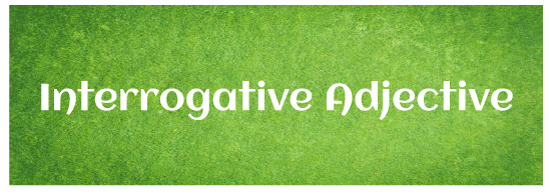
Interrogative Adjective DefinitionAn interrogative adjective, frequently referred to as an interrogative determiner, is an adjective which alters the noun by posing a question. In the English language, the interrogative adjectives include 'what', 'which', and 'whose'. As an example:
In each instance, the interrogative adjective alters the noun it precedes: document, sweater, and desktop. Interrogative Adjectives: How to Use ThemWhat and which are interrogative adjectives that are frequently used interchangeably, although whose is quite distinct. 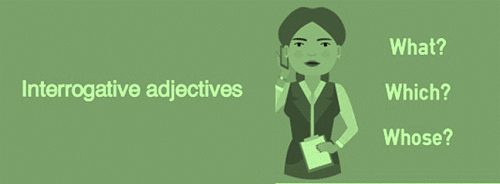
Interrogative adjectives can be used in a variety of ways, These include :
Let's have a look at when each should be used: Which vs WhatWhile what and which are frequently used interchangeably, there is a distinction between the two. Usually, we use the adjective "what" whenever the number of possible answers is uncertain or unlimited, and we use the adjective "which" whenever we either recognize how many options there are or we take into account the choices to be more confined. Consider the difference between the following two sentences:
In the first statement, the person speaking does not have any clue how many possible gifts there are. The speaker appears to have a notion of what the presents might be in the second statement and that the options are restricted. Consider the following example:
Again, the alternatives appear to be limitless in the first example. In contrast, in the second statement, the speaker might have discussed two or three films with the listener and attempted to make the final decision. In most cases, we can choose either adjective what or which without confusing the reader. However, if there are clearly only a few possibilities, which is the appropriate interrogative adjective to employ? WhoseWhose is a possessive adjective that signifies ownership or belonging. We can use it to find out who owns an object or is the owner of the thing/item. As an example:
In these situations, the speaker is attempting to determine who owns the shoes, novel, and responsibility. 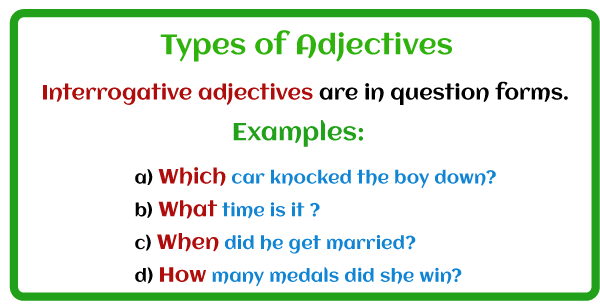
Direct questionsIn regular straightforward questions, interrogative adjectives occur at the start of the phrase and are followed quickly by the noun that they alter. All of the instances we've explored up to this point have been straight queries. On the other hand, interrogative adjectives do not just appear in direct queries. Indirect questionsIndirect questions might also contain interrogative adjectives. When this occurs, they occur in the midst of the phrase but quickly precede the changed noun. A few indirect questions are often used to showcase politeness:
Similar indirect queries are used to seek clarification or for expressing surprise:
In such circumstances, the interrogative adjective is emphasized-we can feel the emphasis on the terms when we speak these statements aloud. In reported questionsInterrogative adjectives also show up in the midst of reported questions. Reported questions are likewise indirect in the sense that they inform us about queries. As an example:
In each of the instances, the speaker is reporting or explaining previously asked questions instead of asking new ones. Other statementsInterrogative adjectives are occasionally employed in sentences that are not questions at all: they don't pose questions directly or indirectly, but they nonetheless similarly change nouns. As an example:
Where should you place an interrogative adjective in a phrase or statement?Interrogative adjectives are typically the first term of a statement since they are frequently used to introduce questions:
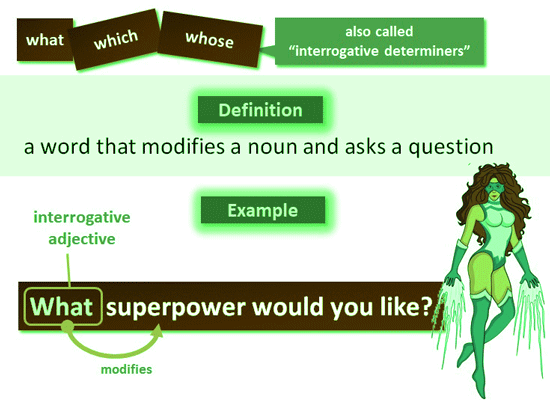
Interrogative adjectives, on the other hand, can occur in the middle of a sentence when employed in indirect questions:
Interrogative Adjectives vs. Interrogative PronounsInterrogative adjectives and interrogative pronouns often get mixed up due to structural differences. Both the interrogative adjective and pronoun desire details and have the same expression, which leads to confusion.
Interrogative Adverbs vs. Interrogative AdjectivesThe adverbs of interrogation are "why," "where," "when," and "how." They can also be utilized for asking inquiries, but the answer will be an adverb. A noun is usually a response to an interrogative adjective. What kind of food would you like? (Chinese) (The response to an interrogative adjective must be something that functions as a noun, such as a noun, a pronoun, or a noun phrase.) When do you have to go? (At 4:00 p.m.) (The answer to an interrogative adverb question is usually something that functions as an adverb, such as an adverb, an adverbial phrase, or an adverbial sentence. In this case, it's a time-based adverbial phrase.) Best practices for interrogative adjectivesThere are numerous aspects to look out for when it pertains to interrogative adjectives. 1. As previously stated, what, which, and whose are not employed as comparative or superlative adjectives. It makes no sense to refer to something as "whicher" or "the most whose." 2. When employed as interrogative adjectives, the words what and which have somewhat distinct meanings. When we pose an open-ended question, or there are no possible answers, we usually use the term what. When particular possibilities are presented or implied, we often use the word which. As an example,
3. A typical mistake is spelling the term whose as who's. Whose is a possessive (interrogative) adjective that implies to ownership. Who's is an abbreviation that means "who is" or "who has." The following two sentences demonstrate how to utilize these two words properly:
4. The only interrogative adjectives include the terms whose, what, and which. The interrogative terms why, when, where, and how are adverbs rather than adjectives when employed in inquiries. These terms are not frequently employed to modify nouns or pronouns when asked a question. As an example, Adjective: Which motorcycle should I try riding? (This alters the noun motorcycle.) It is an adjective.) Adverb: How early were you? (How does the adjective early change? It's an adverb.) Lastly, the terms what, which, and whose can be used as pronouns in questions. When employed in this manner, they do not function as interrogative adjectives: Adjective: What tint was the butterfly? (Explain what an adjective that changes the word tint is.) Pronoun: What is the response? (Explain what a pronoun is. It can exist on its own in this statement.) Note: If your interrogative does not alter a noun or a pronoun, it is a pronoun rather than an adjective (aka determiner).Examples of interrogative adjectives in a sentenceThe below-mentioned statements demonstrate how to utilize the adjectives whose, what, and which in statements. Whose Whose dinner is this? (Whose is the modifier for the word dinner.) It is utilized to ask who the dinner relates to.) What What room is the event taking place in? (What alters the noun room. It is used to inquire about the event's location.) Which Which suitcase is Katie's? (This changes the noun suitcase.) It is utilized to ask for help in recognizing the suitcase that belongs to Katie.) Unlike nouns and verbs, adjective groupings are frequently less specified. Several style guides and grammar resources, for example, regard interrogative adjectives as a category of words called as determiners, in which case they may be known as interrogative determiners or simply interrogatives. 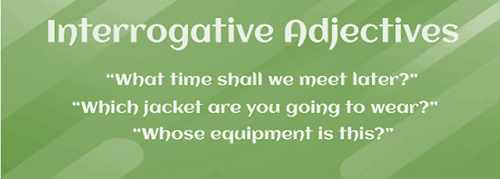
The interrogative adjectives which, what, and whose, unlike many other adjectives, may also be employed as pronouns, as in What exactly is this? Furthermore, using any of these terms as comparative or superlative adjectives makes no grammatical sense: something can be quicker than something else, but something cannot be "what-er" than another thing. While these characteristics may justify defining interrogative adjectives as a distinct part of speech, we regard what, which, and whose to be adjectives when used to alter nouns and pronouns. However, not every style guide will embrace this strategy, so don't be shocked if you don't see these words described as a form of the adjective. What Is the Significance Of Interrogative Adjectives?The ability to formulate questions is essential in practically every conversation. Interrogative adjectives cause the lowest number of writing errors in proficient English learners. The most common error with interrogative adjectives is confusing who and whose. Interrogative Adjectives in Sentences ExamplesThe interrogative adjectives have been highlighted in the sentences below for your convenience.
Forming questions is a skill; one must follow the rules and practices to avoid going wrong with interrogative adjectives. Use Interrogative Adjectives In You Next Write-UpWhile questions are not a common sentence construction in an essay, they do have their uses. Interrogative adjectives are sometimes used to begin these kinds of sentences. If you utilize the words "whose," "which," or "what," ensure that the noun or pronoun you're modifying is highlighted in the statement and that you're using the correct question word for the sentence structure. Using these terms correctly will allow you to write essays with perfect grammar that effectively convey your message.
Next TopicAdjective Phrase
|
 For Videos Join Our Youtube Channel: Join Now
For Videos Join Our Youtube Channel: Join Now
Feedback
- Send your Feedback to [email protected]
Help Others, Please Share









